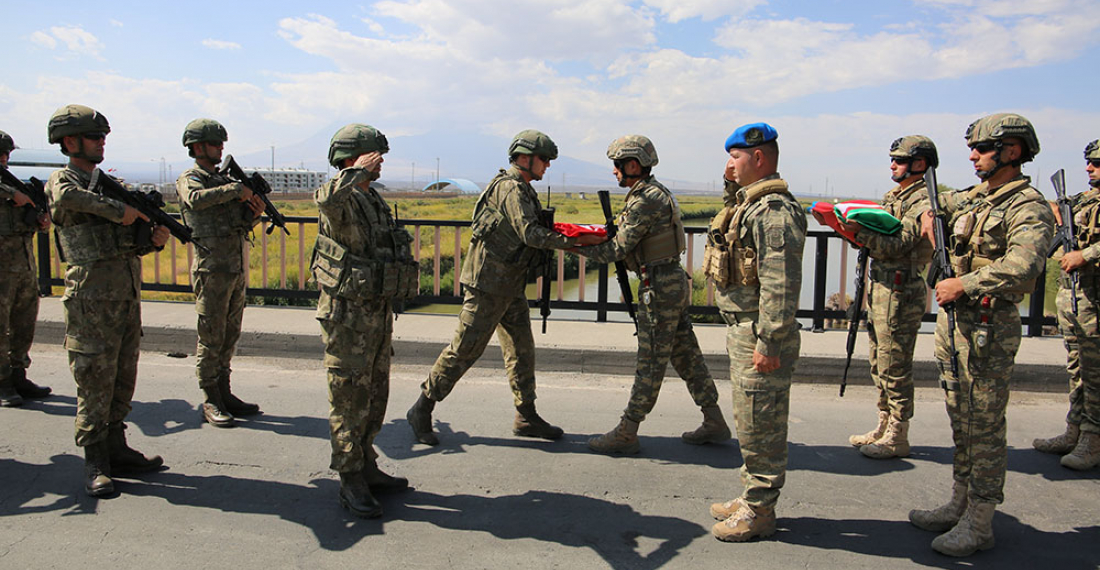As tensions continue to grow between Baku and Tehran, Fuad Shahbazov sheds some light on the reasons for the sharp deterioration in relations, and the likely outcome, in this op-ed for KarabakhSpace.eu.
In the period immediately after the 44-day Karabakh war, Baku-Tehran relations remained on the level of pragmatic co-operation, until the new conservative political establishment ascended to power in Iran. Since then, Tehran’s rhetoric against Azerbaijan has shifted from that of “partnership” to open threats that explicitly neglect the partnership atmosphere. Relations between Baku and Tehran have always been unstable, particularly at the beginning of the 2000s. However, they rekindled when both countries became engaged in regional infrastructure and transit projects, including the Astara–Rasht–Qazvin railway – which is part of the long-awaited North-South Transport Corridor (NSTC) project – and the Nakhchivan-Mashhad railway, as well as the trilateral Azerbaijan–Turkey–Iran and Azerbaijan–Georgia–Iran dialogue platforms.
Moreover, Azerbaijani territory has played a significant transit role in Iran's trade operations with Russia. In January-August 2020, Iran carried out export operations with Russia via Azerbaijan's territory worth $1.5 billion, while trade volume with Azerbaijan amounted to $179.2 million during the January-July 2020 period.
Although economic co-operation boosted Iran–Azerbaijan relations, transforming the relationship into a pragmatic initiative, the subsequent outbreak of a new war in the Nagorno-Karabakh region in September 2020 left the Islamic Republic in a difficult position as it sought to calibrate its policy toward the crisis. Whereas the position of Tehran towards the hostilities close to its northern border was perceived in Azerbaijan to be misinformed, and caused discontent in Azerbaijani society, the Iranian authorities appeared to be more concerned with the “growing influence of Turkey and Israel” in Azerbaijan. Recently, however, Iran’s media began to up the rhetoric against Azerbaijan, with Iran’s Supreme Leader, Ayatollah Ali Khamenei, stating that the “military presence of Israel” in the region is unacceptable. With this statement, it’s clear that Tehran's main concern here is its national security and political interests. Tehran views the Israel-Azerbaijan deepening military partnership in the post-war period as an attempt to encircle it. The victory of Azerbaijan in the recent war reshaped the regional order in the South Caucasus, and more precisely, decreased Tehran’s leverage as Baku gained full control of its border with Iran after 30 years.
This development did not strengthen relations between Baku and Tehran and instead resulted in the latter seeking to strengthen its ties with Yerevan. The situation worsened when Azerbaijani authorities openly voiced their discontent over Iranian trucks carrying aid to Karabakh without the agreement of the relevant authorities in Baku. Tehran has long been engaged in trade with the former Nagorno-Karabakh region, creating alternative routes to circumvent sanctions imposed by the West. Obviously, losing the main Goris-Kafan road with Armenia (the only road connecting the two countries but which at points crosses into Azerbaijani territory) is likely to put an additional burden on Iran's stagnating economy. In retaliation, an agreement was reached on constructing a new road for Iranian trucks going to Armenia during the recent official visit to Tehran of the Armenian foreign minister, Ararat Mirzoyan.
The main escalation phase came when Iran’s military initiated a series of unprecedented large-scale exercises near the border with Azerbaijan for the first time in nearly three decades. The move was met with expressions of concern from Azerbaijani President Ilham Aliyev. On the other hand, in the framework of enhancing its combat capabilities, the Azerbaijani Armed Forces have regularly been taking part in various military exercises with both the Turkish Armed Forces and the Pakistani Armed Forces, some of which in strategic locations, such as the Lachin Corridor and very recently in Azerbaijan’s Nakhchivan exclave, dubbed “Steadfast Brotherhood-2021”. Simply put, Azerbaijan's attempts to take control over regional routes in the Karabakh region, establish a land route with Turkey, and boost its military capabilities increased Tehran’s fears of being excluded from the region.
In addition, Baku’s achievement in regaining control of its border with Iran is seen in Tehran as a possible trigger for increased anti-regime sentiments and separatist rhetoric in the northern part of the country populated by ethnic Azeris – this could potentially further exacerbate the situation.
However, this is unlikely. It is more plausible that Baku and Tehran will find a diplomatic solution, with Tehran accepting the new realities in the region, particularly regarding Karabakh, and putting an end to actions that may provoke a reaction in Baku. Mutual acceptance of each other’s territorial integrity may be a good start for restoring relations.



